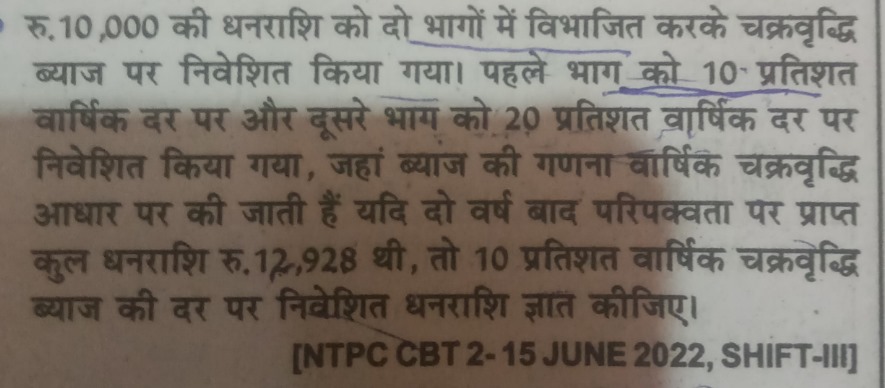10,000 रुपये की धनराशि को दो भागों में विभाजित करके चक्रवृद्धि ब्याज पर निवेशित किया गया। पहले भाग को 10% वार्षिक दर पर और दूसरे भाग को 20% वार्षिक दर पर निवेशित किया गया। यदि दो व... 10,000 रुपये की धनराशि को दो भागों में विभाजित करके चक्रवृद्धि ब्याज पर निवेशित किया गया। पहले भाग को 10% वार्षिक दर पर और दूसरे भाग को 20% वार्षिक दर पर निवेशित किया गया। यदि दो वर्ष बाद प्राप्त कुल धनराशि 12,928 रुपये है, तो 10% वार्षिक चक्रवृद्धि ब्याज की दर पर निवेशित धनराशि ज्ञात कीजिए।

Understand the Problem
प्रश्न यह पूछ रहा है कि 10,000 रुपये की राशि को दो हिस्सों में विभाजित करके चक्रवृद्धि ब्याज पर निवेश किया गया है, पहले भाग का ब्याज दर 10% है और दूसरे भाग का 20% है। दो वर्ष बाद प्राप्त कुल धनराशि 12,928 रुपये है। यह हमें 10% चक्रवृद्धि ब्याज पर निवेशित धनराशि ज्ञात करने के लिए कह रहा है।
Answer
The amount invested at 10% is approximately ₹6,570.43.
Answer for screen readers
The amount invested at 10% interest is approximately ₹6,570.43.
Steps to Solve
- Define the Variables
Let the amount invested at 10% interest be $x$ and the amount invested at 20% interest be $10,000 - x$.
- Calculate the Amount after 2 Years for Each Investment
For the amount $x$ at 10% interest for 2 years, the amount becomes:
$$ A_1 = x(1 + 0.10)^2 = x(1.21) $$
For the amount $10,000 - x$ at 20% interest for 2 years, the amount becomes:
$$ A_2 = (10,000 - x)(1 + 0.20)^2 = (10,000 - x)(1.44) $$
- Set Up the Equation
The total amount after 2 years is given as ₹12,928. Therefore, we set up the equation:
$$ A_1 + A_2 = 12,928 $$
This leads to:
$$ 1.21x + 1.44(10,000 - x) = 12,928 $$
- Expand and Simplify the Equation
Expanding the terms, we have:
$$ 1.21x + 14,440 - 1.44x = 12,928 $$
Combine like terms:
$$ -0.23x + 14,440 = 12,928 $$
- Solve for $x$
Rearranging gives:
$$ -0.23x = 12,928 - 14,440 $$ $$ -0.23x = -1,512 $$
Dividing both sides by -0.23:
$$ x = \frac{-1,512}{-0.23} \approx 6,570.43 $$
- Find the Amount at 10% Interest
Thus, the amount invested at 10% interest is approximately ₹6,570.43.
The amount invested at 10% interest is approximately ₹6,570.43.
More Information
The problem involves splitting a total sum and calculating the compound interest separately for each part. It's a practical example of applying algebra and compound interest formulas in finance.
Tips
- Incorrectly applying the compound interest formula by omitting the exponent for the number of years.
- Miscalculating the total amount by failing to combine the amounts from each investment properly.
AI-generated content may contain errors. Please verify critical information